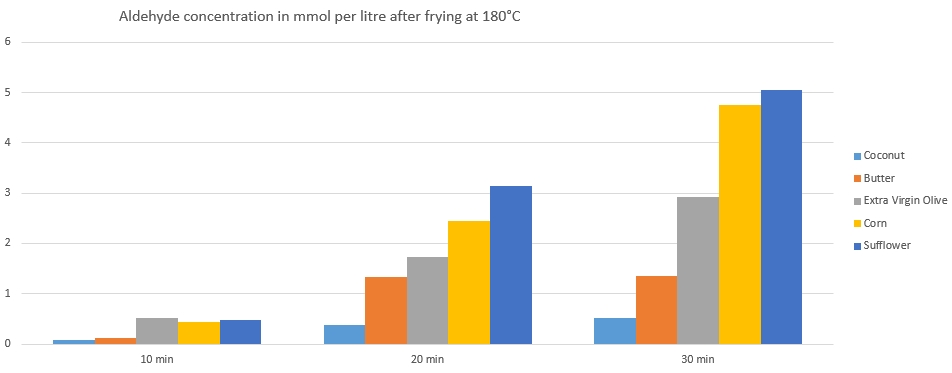What is the best oil to fry foods?
Whilst watching the news, I saw a banner stating New study shows saturated fats are healthy. Intrigued, I found the source of this information – an article titled Cooking with vegetable oils releases toxic cancer-causing chemicals, say experts, which appeared in the London Telegraph. 1
The article actually stated that frying food in vegetable oils creates more aldehydes (a cancer causing chemical) than frying food in saturated fats. According to the article,
The research did not indicate that saturated fats are better for your health than vegetable oils. It stated that if you fry foods in oils then you are better off if you use saturated fats as they are less reactive.
Using any added oils is undesirable
Using any type of added oil (olive oil, coconut oil and saturated fats) is undesirable. Fats contain 2¼ times more calories than the same weight of carbohydrates. They are not as filling so you can eat more.
All fats damage the endothelial lining of the arteries – cells cannot produce nitric oxide which is essential for vascular health. Nitric oxide dilates the blood vessels which increases blood flow.
Frying foods is undesirable
In addition to the aldehydes mentioned in the article, frying also produces peroxides, heterocyclic amines, polycyclic aromatic hydrocarbons and other undesirable substances. Frying foods in any type of oil is not desirable.
Frying foods results in a much higher cooking temperature than steaming or boiling. It also adds significantly to the amount of calories consumed. Boiled potatoes contain 78 kcal / 100 g whereas French fried potatoes contain 166 kcal / 100 g. 2
Cooking times are significant
The amount of time the oil is heated has a significant impact on the amount of toxic substances produces. Below is a graph derived from data presented in the article.
If you insist on using added oils and frying foods then do not fry them for any length of time.
After 10 minutes of frying, the aldehyde concentration for all oils is relatively low. After that it rises substantially for all oils with the exception of coconut oil.
Consuming fried fish or potato chips from commercial premises where the oil has been heated and reheated frequently must be a cause for concern.
Last updated on Monday 5 December 2022 at 15:42 by administrators
Footnotes
- Mendick, R. (2015) Cooking with vegetable oils releases toxic cancer-causing chemicals. The Telegraph (London). 7 November.
- US Department of Agriculture (n.d.) USDA Food Composition Databases [online]. Available from: https://ndb.nal.usda.gov/ndb/search/list







